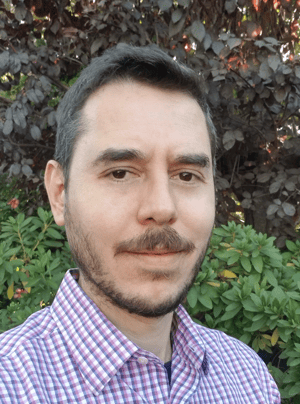Mentorship Spotlight: Raul Aguilar, Gilead Sciences
In this blog series to commemorate National Mentoring Month, we are celebrating some of our incredible mentors in the Data Science for All program.
Raul Aguilar is Associate Director of Biostatistics at Gilead Sciences, Inc., and a mentor for DS4A / Empowerment. He answered a few questions for us about his experience, career advice and creating more inclusive workplaces.

Tell us about a pivotal moment in your career: what was the backdrop, what did you do, what did you learn?
I still believe that a pivotal moment in my career at Gilead happened just a few weeks after joining. I was asked to help address comments from reviewers regarding a paper I had not previously worked on. Hence, I had to familiarize myself with the study and the analyses in a short amount of time. I noticed that a variable, body mass index (BMI), had been split into categories based on the median value present in the population of the study. This is a common practice when categorizing variables, but not adequate for BMI because there are established cut off values by the center for disease control (CDC) to classify low-, normal-, over-weight, and obesity. Once we updated the categories in the analysis, the model gained clarity. The study included subjects, all infected with hepatitis B and with a wide range of liver damage (including cirrhosis), who had been treated with an antiviral for 5 years. We were trying to understand why some subjects who reached viral suppression were able to reverse cirrhosis after 5 years, but others were not. Part of the answer was related to whether subjects were overweight or obese. This had not been apparent when BMI was not adequately categorized. The paper established the possibility of reversing cirrhosis, a condition previously believed to be final (PMID: 23234725 DOI: 10.1016/S0140-6736(12)61425-1).
Taking the time to understand the data before pounding it to tell any story helped us tell a robust and succinct story. I was able to contribute to the team in a much more significant way.
Who were your mentors and role models when you were starting out? What’s the best professional advice you received?
I cannot single out a single person as a mentor or role model during my professional career, probably because so many of those I work and interact with display such a high level of professionalism and drive. The teams I have worked with, all aim for the highest goals and try to make a difference in this industry.
I have received several pieces of valuable advice along my professional career. First, to listen more and speak less. If you are doing the latter more, there will be information you will miss by hearing yourself instead of others. Second, to ask the right questions and make sure there is a clear understanding between parties. Communication is already difficult by itself, when communicating difficult ideas, the complication grows exponentially.
What have you gained from mentoring and coaching - both professionally and personally? Did anything surprise you when you started mentoring?
Mentoring and coaching have provided me the opportunity to bounce new ideas off people that I might not have had otherwise. If these activities are not enriching to both mentees and mentors, then something is not working right in my opinion. Clearly, the experience of the mentor is very important, but the curiosity and drive of the mentee are also vital in this relationship. Probably one of the most pleasant surprises I have had is that sharing my perspective in an active dialogue allows me to reassess my own perceptions. I would even say that mentoring relationships do not reach their full potential until there is some vanishing of the line between the professional and personal topics. This event denotes the building of trust and it is then when both parties benefit the most.
Can you give us an example of how data skills are increasingly needed in your role and business?
Data skills have always been needed in drug development, even more in the role of a biostatistician. What has dramatically changed in the last few years is the type of data and the amount of it. Hence, to be specific, it is the diversity of needed skills that has increased. In the old days of statistics there was not enough data. That is what drove many methods, the need to handle scarcity. These days we suffer from the opposite problem and now we might have too much data. In the case of clinical trials, we do not just collect data during the subject’s visit at the site, we can collect data in a continuous way using activity-, heart rate, sleep-trackers. The challenge is to figure out how to make sense of the overwhelming amount of data.
You’ll be mentoring a group of Fellows in our inaugural cohort in the Data Science for All/ Empowerment program, an initiative to create equal opportunities to access the data-driven jobs of tomorrow. What can individuals and organizations do to help create more diverse and inclusive workplaces?
From the individual candidate perspective, they need to believe in themselves and set themselves up for success. It is very important to believe you can accomplish something. This does not mean to deny any potential hurdle or need for improvement, but to believe that given the opportunity and putting the necessary work into the project you will succeed.
From the perspective of organizations, the first step is to perform an introspective analysis and honestly assess if diversity and inclusion are currently present. If the answer is negative, then the second step is to create awareness of this shortcoming within the organization and change the patterns that led to the lack of diversity and inclusion in the first place. If within an organization everyone looks like you, thinks like you, and sounds like you, this is a big mistake because you are missing out on diversity of thought.





